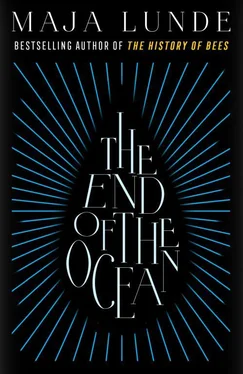And I knew why she was laughing.
A helpless young whippersnapper with a child in tow, a boat on land. I was lacking everything, even a plan.
Just as suddenly as she’d begun laughing she stopped.
She stood up. It was an effort, because she was so frail, but she tried to conceal it.
Then, without saying another word, she turned her back on me and walked back to the suitcase on the bank of the canal. But she didn’t pick it up. Just climbed down into the canal. Passed the boat and kept walking.
“Marguerite?” Lou called.
She didn’t answer.
“Where are you going?”
Then Marguerite turned to face me.
“To the ocean. I’m walking to the ocean.”
And then she kept going. Her back was so small and narrow between the concrete walls. But she held her head high.
She staggered slightly.
The dried sludge whirled up around her feet as she walked.
Soon she would be gone and the dust would settle.
But her suitcase remained where it was on the bank. Her suitcase, the only thing she had.
I grabbed it and ran after her.
She turned around, her face quizzical, a tiny glimmer of hope in her eyes.
“Here,” I said.
But the hope was extinguished immediately. “What shall I do with it?”
All the same, she took hold of the handle of the suitcase and started pulling it behind her.
The small wheels dug down into the dry ground, but she kept dragging it anyway. Pulled and pulled, filling the air behind her with dust.
It will nonetheless be the last I will see, I thought, the last I will see of her, her back in the canal, the dust, the suitcase. The last sound will be that of suitcase wheels against desiccated mud. This is what she looks like when she walks. And just this sound, nothing else. No words, screams, tears.
But I had forgotten about Lou. She was there, because she had come down from the boat without my noticing it and had seen the same thing that I’d seen.
Now she filled the air with her sounds, her words, her screams, her tears. Yet again she howled in my arms, yet again she protested against my decisions. And this time there was no stopping her.
“You can’t leave, Marguerite! She can’t leave, Daddy! She has to stay here with us!”
Everything inside me came to a halt and everything began. At long last, I listened to my child.
And then I ran. Towards the dust whirling upwards. Towards the suitcase. Towards Marguerite.
Igo to the bow to loosen the mooring but end up sitting on deck for a little while, listening. There’s a silence inland here, the likes of which I have seldom heard. The canal is silent beneath me—there’s no wind, old trees lean over the water, their leaves motionless—and neither are there any birds or insects to be heard.
The feeling of being cramped, confined, it’s not just the sluices that give me that feeling, it’s all the wildlife around me, the monitored canal, the trees planted in straight lines, the flat farming landscape surrounding the narrow strip of water. Even when the canal passed through woods, I felt the same thing, as if the woods down here are also under control, a cowardly nature without claws, boring through and through, planned by humans. Imagine living here, imagine being able to live by the mountains, near the gorges, the ruggedness, the plunging drama, and then choosing this instead?
I stand up, take hold of the mooring line, loosen it quickly. I am on the outskirts of Timbaut now, today I will find his house, find him.
Today I will throw the ice out in front of him.
“Here’s the rest of the ice,” I’ll say. “What little is left. I thought you’d like to have it in your drink.”
And he will stare at the ice with big eyes.
“The rest of it, as you have no doubt heard, has been dumped into the ocean,” I will add. “And melted. Just as well, don’t you think, that it melts, sooner rather than later? That’s how you want it.” I will speak these words like a declaration, not a question.
Maybe the plump Trine will come out, she will stand there, gaping a little, her appearance every bit as indifferent as she is.
Both of them are clutching wine glasses and I toss a few lumps of ice into them, vintage ice , maybe I’ll say, while the rest lies melting on the ground, and if there are any grandchildren there, they’ll come out as well… no, to hell with the grandchildren, they don’t care anyway, they just want to play computer games, but Magnus will stand there with his mouth wide open, so I can see his uvula, deep in the back of his red-wine-stained gullet, and he will scratch his padded stomach in confusion under the expensive but loose-fitting linen shirt and then I will turn around and leave, but before I do that, I will make the very last statement:
“I’ll be keeping an eye on you, Magnus. If you take more ice, I will dump that as well. As long as you keep this up, you can be sure that I will also continue doing my part.”
Doing my part…
No…
I can’t say that, can’t say it like that.
I’ll be keeping an eye on you…
Good Lord.
They will look up, the two of them, from the ice, from the red wine, look at each other, their eyes will meet above their glasses, telling gazes, what has she done now? Then Magnus will turn towards me with a mild, puzzled smile—Signe, what are you doing, he will say, he will think.
And then they will clean up after me, put the plastic containers in the two-car garage, pour another glass of expensive red wine and talk about how happy they are that they have one another, about the life they have lived, the harmony they feel, all the lovely, small experiences they are accumulating, how nice to be able to approach old age with such peace of mind, such a house, such a garden, such a spouse, such joy, so good to be able to approach old age knowing that one has made the right choices.
And I… I will go back to Blue , sit down in the saloon, it is empty now, the containers are gone, I will miss them, because it was all I had, my rage in these containers.
I’m doing my part.
Or I can turn around, go back, navigate through all the sluices I have forced my way through, put up the mast, get rid of the tires, refuel, head out to sea, to the west, disappear in the Atlantic Ocean and dump the containers out there somewhere, not just the ice but the containers too, there’s so much plastic in the ocean, such an endless amount of plastic, eight million tons are dumped in the ocean every single year, nobody will notice the difference, these containers can float around out there, along with all the rest of the plastic, in a way they belong there, and the ice, the water, will disappear in the ocean, become salt, undrinkable, useless, become a part of the salty desert our oceans are, a desert that is constantly growing.
“No,” I say loudly and suddenly, the sound of my voice strident as it breaks the silence. Because you’ve traveled all the way here, come all this way, you have covered so much ground, you are here, you, this boat… this is a choice you have already made and, strictly speaking, Signe, strictly speaking, you have very little to lose.
*
The boat glides through the water, closer and closer to his house. I have plotted in the address on the GPS. The landscape is as flat as a pancake: there is only a single wooded hill a short distance away on which to focus. Maybe they call that a mountain, the people who live here, but it’s actually only a misplaced bulge.
Five hundred meters, one hundred meters and then I’m there. The house must be located behind a dense grove right beside the bank of the canal.
Читать дальше










